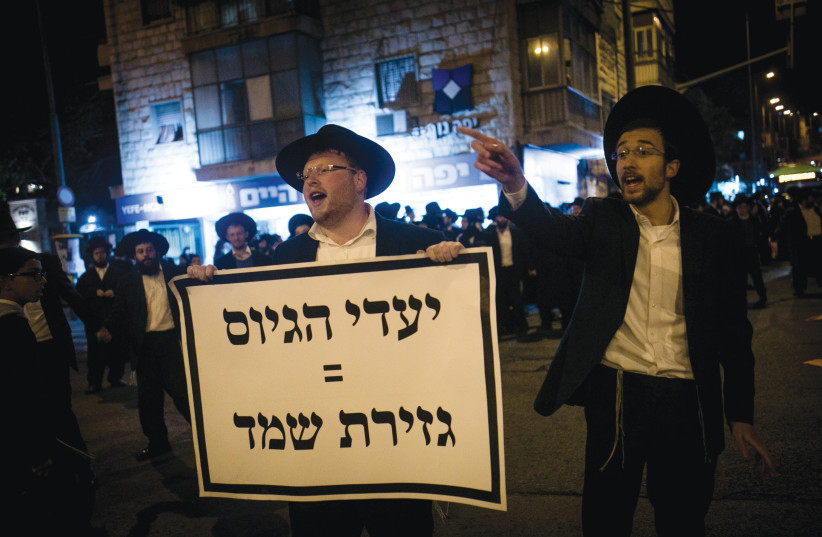Prime Minister Benjamin Netanyahu rushed between meetings with government officials and coalition members on Tuesday to reach agreements concerning a new law on the conscription of haredi (ultra-Orthodox) young men as a deadline set by the High Court of Justice was set to end on Wednesday.
Originally, the government was set to vote on a proposed decision to advance a new bill concerning the need to draft haredim into the IDF on Tuesday, but the vote was delayed indefinitely due to disagreement surrounding the details of the decision.
According to a draft of the decision, the bill must include annual enlistment quotas, which would “reflect a significant and gradual increase in the rate of enlistment” among haredim compared to the current rate of enlistment.
The bill would also include “positive and negative financial incentives for meeting or not meeting the annual recruitment quotas.” The incentives would include limiting financial support for haredi educational institutions.
The draft did not say when the negative financial incentives or sanctions would be implemented or how they would be enforced.


Across the board, everyone's unhappy
On Monday and Tuesday, members of both the coalition and the opposition expressed outrage at the proposed decision, delaying the vote.
The High Court of Justice ordered the government in February to justify a resolution it passed in June, instructing the IDF not to draft haredim despite a law on the matter expiring.
On Tuesday morning, the Finance Ministry’s legal adviser, Asi Messing, sent a letter to Shlomit Barnea Farago, the legal adviser for the Prime Minister’s Office, warning that the proposed outline for the law “essentially copies the same measures that were tried in the past and failed.”
Messing noted that the proposal, as well as several other laws being promoted by the government to increase the time that non-haredim would have to serve in mandatory and reserve service, will have “far-reaching economic effects” in terms of both the economy and the national budget.
The adviser noted that if 10,000 yeshiva students were drafted, it would provide a NIS 190 million boost to the economy each month and a total of NIS 6.7 billion for the full three-year military service of one recruitment cycle. In February, the IDF informed the Knesset that 66,000 yeshiva students received exemptions in the past year alone.
If 63,000 yeshiva students were drafted, the monthly benefit to the economy would jump to NIS 1.2 billion. Messing noted that since the haredi sector is growing rapidly, the benefits to the economy from drafting yeshiva students would grow as well. He pointed out as well that drafting yeshiva students will also increase the chances that they join the workforce, leading to even more economic benefits.
The adviser added that the bill, in its current form, is unlikely to increase enlistment among haredim, nor would it increase haredi participation in the workforce. He also pointed out that the mentioned quotas would not address the manpower shortage impacting the IDF.
Messing wrote that the only sanction mentioned in the bill concerned the budgets provided to yeshivas, something that could easily be bypassed by raising the budgets in kind. He stressed that only sanctions that affected the individuals dodging the draft would work.
Early on Tuesday morning, KAN Reshet Bet radio reported that Defense Minister Yoav Gallant instructed his office not to cooperate with the prime minister on the draft law in its current form. Gallant’s office denied the report later in the day, adding that the defense minister had made his position on the issue of drafting haredim clear and that he would only support a proposal that received the consent of all the parties in the coalition, including Benny Gantz’s National Unity Party.
Gantz rejected the version of the bill reported on Monday, saying that he would resign from the government if such a bill was advanced.
Netanyahu met with Attorney-General Baharav-Miara and Justice Minister Yariv Levin to work on a new proposal on Tuesday morning. KAN reported later in the day that Netanyahu was planning to present a new version that would include a quota requiring 2,500 haredim to be drafted every year. The attorney general is reportedly demanding that the new version also include stricter financial punishments.
The haredi parties have demanded that the law not include specific quotas for haredi enlistment in the text of the law, instead allowing the defense minister to set the enlistment goals. The haredi parties are also opposed to limiting the number of yeshiva students eligible for exemptions from the draft.
Netanyahu met with leaders of the haredi parties on Tuesday evening, with the party members warning the prime minister that the current version of the bill was unacceptable to them and could force them to leave the government, according to KAN.
During the meeting, United Torah Judaism warned that it would leave the government if the bill included financial sanctions and quotas, Ynet reported. The party denied that it had made such a threat and added that such a scenario is unlikely at the moment.
According to KAN, the haredi parties told Netanyahu that his demands were against the coalition agreements he signed with them and that they would need to speak with the rabbinical councils that advise them. “If we come with such a proposal to the rabbis, there’s a concern that they’ll tell us to leave the government,” warned one party leader during the meeting.
According to the report, Netanyahu asked the haredi leaders to agree to have quotas determined by the government and not within the law so that the quotas could be changed in the future.
I24 reporter Kobi Dahan reported on Tuesday that Netanyahu was supposed to meet with the haredi MKs on Tuesday, but most of the MKs were too drunk due to the Purim holiday to hold the meeting despite the looming deadline. One MK did arrive at the meeting but fell asleep in his chair, according to the report.
Finance Minister Bezalel Smotrich referred to the controversy surrounding the bill at Walla’s Economic Summit on Tuesday, saying, “I think it’s clear to everyone that what was is not what will be,” adding that he was not trying to “earn political capital” or “hate or incite against anyone.”
Smotrich added that “there are many people in the haredi community who want” to draft as long as they are not forced to do so.
National Unity MK Orit Farkash Hacohen noted in a post on X that the reported conscription goal set by Netanyahu was identical to the goal set in 2011, a goal that was never fulfilled. Farkash Hacohen attached a link to the decision from 2011 in the post.
The “Brothers in Arms” group held a protest outside the Prime Minister’s Office on Tuesday morning at the time when the vote on the bill was scheduled to take place, leading donkeys around and chanting, “We are done being your donkeys. What was is not what will be.”
“Without [enlistment] goals in the law, without real fines, without criminal sanctions, without defining who is haredi, the ‘evasion law’ is the continuation of the clearance sale of the State of Israel,” stated Brothers in Arms. “Netanyahu continues to lie but we have woken up, and the streets will be filled with the people of Israel.”
Past failed attempts
The Knesset has tried repeatedly in the past two decades to pass laws that would increase enlistment among haredim.
In 2002, the Knesset passed the Tal Law, which established the requirements haredi yeshiva students would need to meet to receive an exemption from IDF service. The law was shot down by the High Court of Justice in 2012, as the court determined that it did not lead to an equal sharing of the burden of military service in Israeli society and that it violates the Basic Law: Human Dignity and Liberty.
In 2014, the Knesset passed another law, which included quotas for the enlistment of haredim and criminal sanctions against those who evade service, as well as a limit on the number of yeshiva students who can receive full exemptions from military service. The law was amended in 2015 to have the quotas set by the government and not by law and extended the “grace period” in which exemptions could still be issued. The 2015 amendment was struck down by the High Court of Justice in 2017 for violating the principle of equality, as it did not change the situation concerning the enlistment of haredim.
